Politics
'I got a job, I got class': Why Cal State L.A. isn't roiling with protest
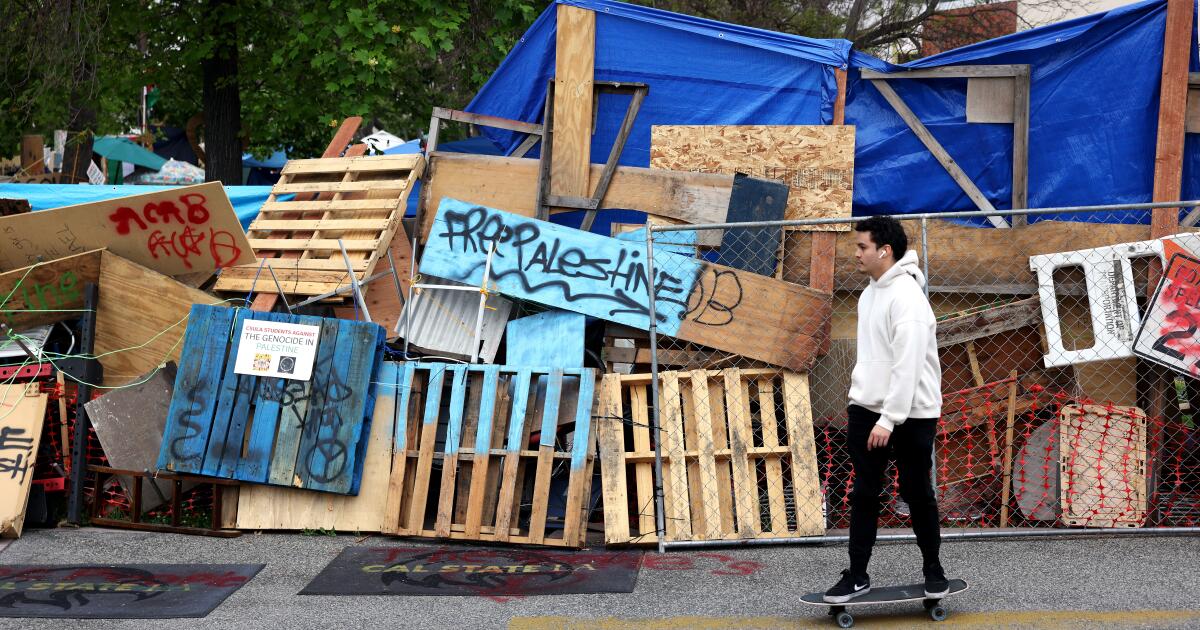
On a recent Wednesday afternoon, the Cal State L.A. student union buzzed with people eating lunch. Outside, students took graduation photos wearing caps and gowns beside a yellow sign that read, “We are L.A.”
Not far away, a small group of student protesters continued their weeks-long encampment in solidarity with the people of Gaza.
On May 1, organizers established a Gaza Solidarity Encampment on a patch of grass beneath the “Olympic Fantasy” tile mural near the heart of campus. The encampment barrier, fortified with blue tarps and plywood, displays artwork decrying the bloodshed as Israel continues its military offensive in Gaza. Graffiti on a campus building behind the encampment trumpets “Free Gaza” in bold, colorful letters.
The campers’ demands on university leaders are much the same as those from protest organizers at USC, UCLA, Pomona College and other campuses across the country. They are asking the university to disclose its financial investments in companies that supply weapons to Israel and to divest from those funds. They want the Cal State L.A. president to issue a statement supporting a cease-fire in Gaza.
But there are also notable differences in the protest scenes as the encampment enters its fourth week.
The vibe here has been much quieter than the raucous events that unfolded at UCLA and USC, where police in riot gear moved in to clear encampments. Cal State L.A.’s president has said she would let the peaceful demonstration continue without law enforcement intervention. While some encampments have drawn many hundreds of students, the members of Cal State L.A.’s encampment could be counted in the dozens.
Part of that difference is sheer size: Cal State L.A. enrolls 23,000 students, about half the enrollment of UCLA and USC. And unlike those schools, Cal State L.A. is a commuter school. Only 1,000 to 2,000 students live on campus.
The demographics at Cal State are also markedly different from schools such as UCLA and USC. About 75% of Cal State’s student body is Latino, and many of the students are working-class and older than traditional college populations. Just more than 2% of students come from other countries.
By contrast, Asians and whites make up more than 60% of the undergraduate student body at UCLA, where 9% of undergraduates and 17% of graduate students hail from other nations. At USC, a private school, 27% of students are international.
But perhaps the greatest distinction involves free time: Most students at Cal State L.A. are juggling schoolwork with jobs and pressing responsibilities at home.
Shawna Andrews, a nursing student at Cal State L.A., said she hadn’t heard much about the Israel-Hamas war until she saw the encampment. The 29-year-old appreciates the message the protesters are sending. But Andrews, who is graduating, said she simply hasn’t had the bandwidth to pay close attention to the Gaza war between being a full-time student and caring for a family member in the early stages of dementia.
“There are other things that just grab my focus that are here, that are next to me, surrounding me, versus something that’s going on overseas,” Andrews said.
Brian Hernandez, an information systems major, echoed those sentiments. “You do need a little bit of privilege to actually protest … that type of way. To sit in a random place and just hang out,” the 25-year-old said. “I can’t spend days sleeping on a campus. … I got a job, I got class.”
While their numbers are relatively small, the students occupying the pro-Palestinian encampment at Cal State L.A. are ardent about their cause.
(Christina House / Los Angeles Times)
Though their numbers may be smaller than at some other Los Angeles-area schools, the students who raised the Cal State L.A. encampment are ardent about their cause. They vowed this week to stay until their demands were met, even as the semester wound down and commencement ceremonies took place.
“In terms of demographics, the people who are in there, they may not be related to the Palestinians in that way, but we deeply, deeply care because it’s the most devastating thing ever,” said one organizer, who provided only her first name, Sarah, for fear of being harassed online. “We’re students and we’re community, and we still care. Those are the values that our families have instilled in us.”
Last week, Cal State L.A. President Berenecea Johnson Eanes and other administrative leaders met inside the encampment with the protesters to discuss their demands. Eanes reaffirmed her commitment to allowing the students to continue their encampment as a form of free speech. She agreed to disclose Cal State L.A.’s foundation and auxiliary investments, which campus leaders have control over, and to recommend revisions to its investment policies “by adding a human rights-based approach” and reviewing current investments to align with that policy.
Eanes did not agree to issue a statement supporting a cease-fire in Gaza.
“I want to emphasize and I understand, again, that this has been a traumatic experience for many people and many people are suffering pain. It is not lost on me at all,” Eanes said. “I hope that you see my conversation with you as my ongoing commitment to staying in collaboration and staying in communication.”
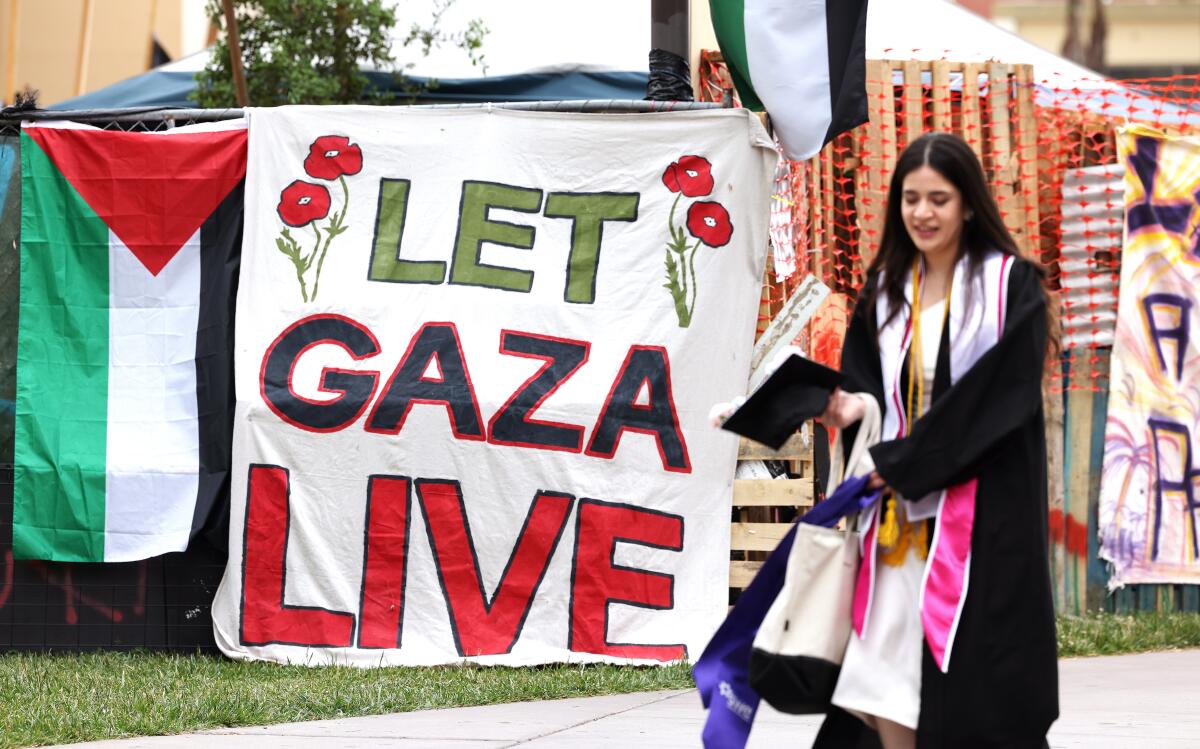
Many Cal State L.A. students live off campus and hold jobs. “I can’t spend days sleeping on a campus,” says one student not involved in the Gaza war protests.
(Christina House / Los Angeles Times)
Leda Ramos, a professor of Chicana(o) and Latina(o) Studies, was also at the encampment last week, helping students monitor who entered. They welcomed passersby to stop in and ask questions, which some did. Ramos’ two daughters are also participating in the encampment, she said.
“This is a demographic that — it’s amazing — that commutes for the most part and really struggles with economic security, and … [there is a] huge number of first-generation students,” Ramos said. “So we’re aware of how this is such a sacrifice.”
One student organizer said she was maintaining a work and class schedule while also staying at the encampment.
“We’re not only working-class students going to work, having jobs, but we also know what’s going on the world and we’ve taken it upon ourselves to be here,” said Red, who like many of the protesters declined to give her full name for fear of harassment. “It’s not that we’re unaware. I think the system has made it so that we don’t focus on those things.”
The community, Ramos noted, has been supportive with donations of food and other items. As Ramos spoke, a woman stopped by to hand one of the organizers a $20 bill. Moments later, a student appeared with a donation of two large jugs of water and offered two thumbs up.
Another student, wearing cap and gown, took a break from graduation photos to chat with the protesters. “Thank you for standing up,” the student told them. The photographer, also a student, shared her gratitude as well.
“I’m Lebanese; this has been my reality for my entire life,” the student said. She promised to stop by later.

Politics
Biden strikes gold in California, one week after Trump's massive haul in the blue bastion
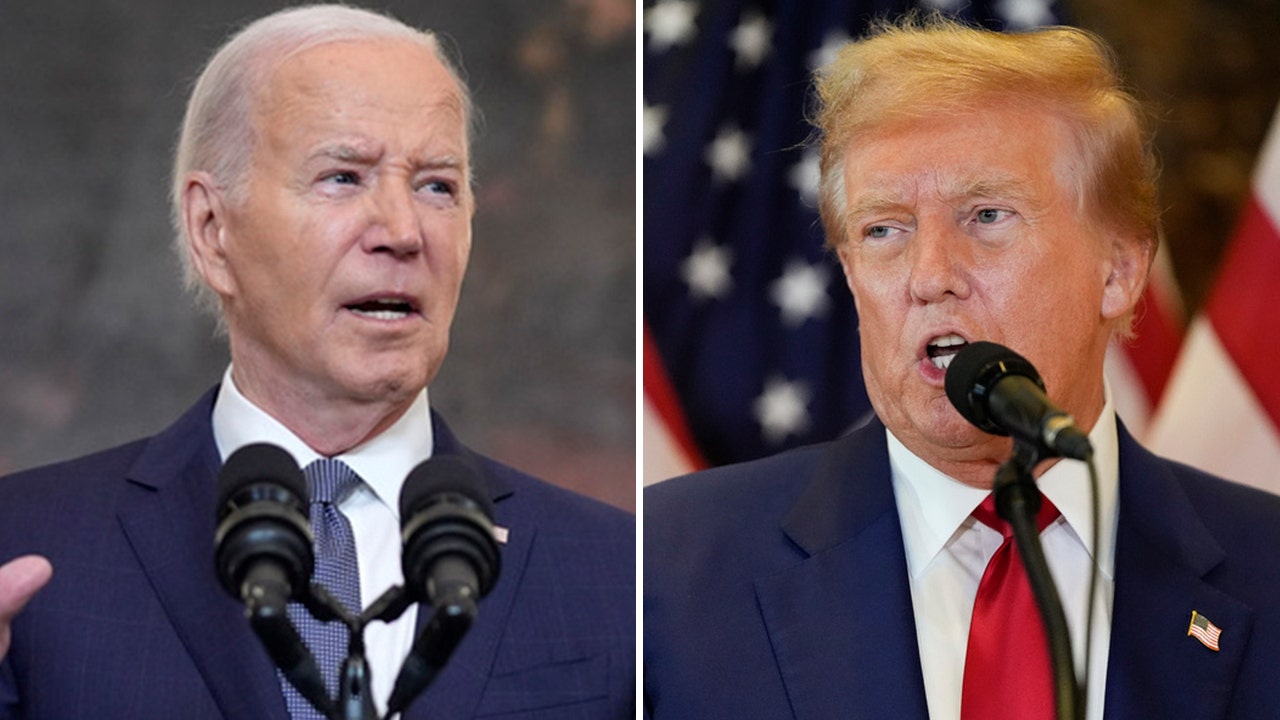
After former President Trump’s lucrative, three-day swing through California, President Biden has returned to the West Coast to tap into the Democrat-dominated state’s political ATM.
With less than five months to go until the November election, late-night TV host Jimmy Kimmel will interview Biden and former President Obama as they team up with Hollywood heavyweights George Clooney and Julia Roberts at a star-studded fundraiser the president’s campaign said is already breaking records.
Biden’s campaign boasted “the event has already raised over $28 million and counting — making it the biggest fundraiser in Democratic Party history.”
The haul tops a fundraiser with Biden, Obama and former President Clinton in March at New York City’s Radio City Music Hall, which raked in $26 million.
TRUMP HAULS IN PLENTY OF GREEN DURING SWING THROUGH LONGTIME BLUE STATE
Former presidents Clinton (right) and Obama (left) and President Biden (center) headline a Democratic Party fundraiser at Radio City Music Hall March 28, 2024, in New York City. (Getty Images)
But Trump, the presumptive GOP nominee, hauled in over $50 million in early April at a fundraiser at the Palm Beach, Florida, home of billionaire investor and hedge fund founder John Paulson. It was the most money ever brought in at a single fundraising event and shattered the record Biden set just a week and a half earlier at Radio City Music Hall.
It’s the latest case of national politicians coming to California to pad their campaign coffers. According to figures from the Federal Election Commission, Biden and Trump have raked in more money in California this cycle than any other state.
“When politicians look to the west, they see a field of green,” veteran California-based political scientist Jack Pitney at Claremont McKenna College told Fox News.

President Biden and former President Trump have both hauled in millions at fundraising events in California as they face off in their 2024 election rematch. (AP Photo/Julia Nikhinson and Evan Vucci)
Tickets for Saturday’s gala at the Peacock Theater in downtown Los Angeles, which an invitation describes as a “historic night,” ranged from $250 for a single person to get in the door to half a million dollars for special access, photos with Biden and Obama and invitations to an after-party.
The president arrived in California one week after Trump left the Golden State.
Trump’s team said when all the money is counted, the presumptive Republican presidential nominee was expected to haul in roughly $27.5 million from three fundraisers in California and one in Las Vegas, a senior campaign official told Fox News.
WHY TRUMP’S SAN FRANCISCO FUNDRAISER WAS FRUITFUL IN MORE THAN ONE WAY
And the Trump campaign said an additional $6 million was raised for outside groups supporting his 2024 election rematch with Biden.
Trump has been aiming to close his fundraising gap with Biden. In April, his campaign and the Republican National Committee (RNC) for the first time raised more than the Biden campaign and the Democratic National Committee.
Trump’s campaign announced a week ago it and the RNC hauled in a stunning $141 million in May, fueled in part by the former president’s guilty verdicts in his recently concluded criminal trial.

Former President Trump appears in Manhattan Criminal Court May 30, 2024, in New York. (AP Photo/Seth Wenig, Pool)
Trump was found guilty of all 34 felony counts in the first trial of a former or current president in the nation’s history.
The former president’s campaign noted that, in the first 24 hours following the verdict, it and the RNC brought in nearly $53 million, which counted toward May’s total.
The Biden campaign has also been raising money from the Trump verdict, and a source told Fox News “the 24 hours after the verdict were one of the best fundraising 24 hours of the Biden campaign since launch.”
While Trump’s California fundraising haul was fueled by top-dollar GOP donors, including tech industry investors and hedge fund giants, Saturday’s fundraising for Biden is being orchestrated by the Democratic Hollywood machine.
It’s no surprise. The entertainment industry, which showered presidents Clinton and Obama with campaign cash, has long been known for its Democratic leanings.
And while the 81-year-old Biden doesn’t have the tight relationships with Hollywood that his Democratic predecessors enjoyed, he can still draw a crowd.
“Any Democratic presidential candidate is going to be able to raise a lot of money in California, and an incumbent president has a big advantage. When the president enters a room, it fills up with cash,” Pitney said.
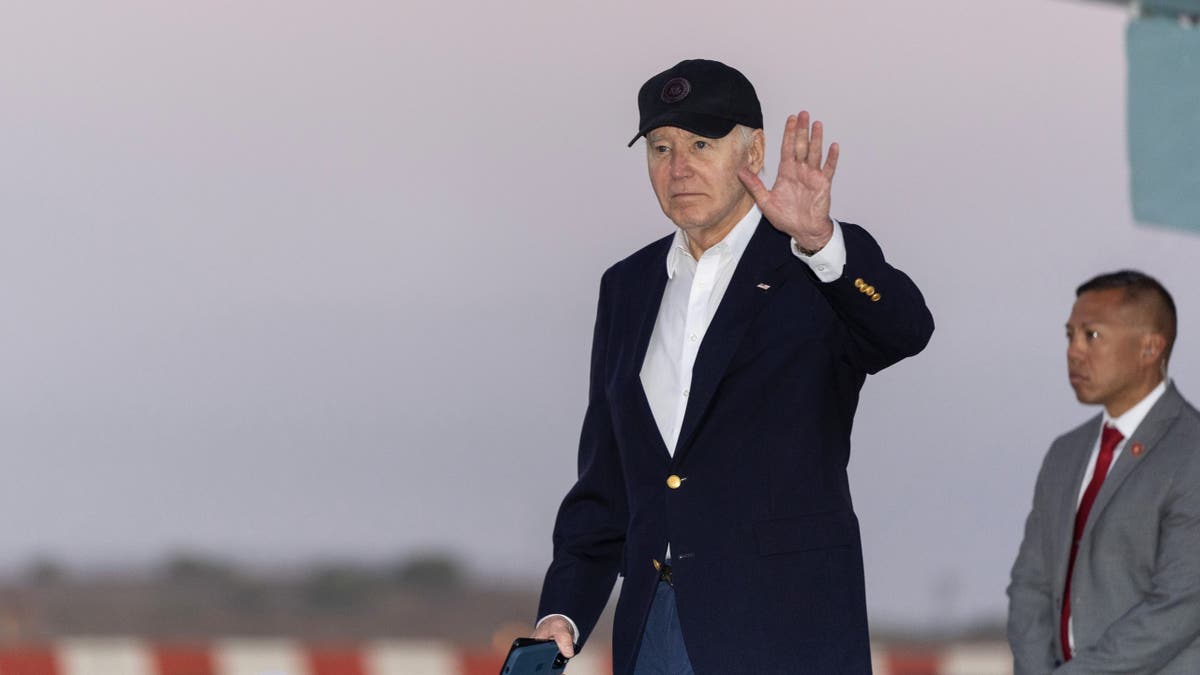
President Biden waves as he arrives on Air Force One June 15, 2024, in Los Angeles. Biden will attend a campaign event Saturday night. (AP Photo/Alex Brandon)
Major strikes by two Hollywood labor unions representing film and television writers and actors from May through November of last year delayed Biden from raising money in Los Angeles entertainment circles.
But the president started making up for lost time in December with a major fundraiser hosted by famed directors Steven Spielberg and Rob Reiner. Saturday’s mega-fundraiser was orchestrated by media mogul and Democratic rainmaker Jeffrey Katzenberg, who’s a Biden campaign co-chair. Katzenberg also put together the Radio City Music Hall fundraiser.
The Biden campaign and the Democratic National Committee have enlisted the help of plenty of stars and well-known performers from the entertainment world as the president runs for a second term.
Among those lending a hand is famed actor Robert De Niro, who headlined a Biden campaign news conference outside the New York City courthouse during the final days of Trump’s trial.
The news conference went viral after De Niro, who portrayed mobsters in such cinematic masterpieces as “The Godfather Part II” and “Goodfellas,” screamed at nearby Trump supporters that “You are gangsters” as they yelled obscenities at the actor.
Actor Mark Hamill, who portrayed Luke Skywalker in the Star Wars saga, made a recent unannounced appearance at the White House briefing room to praise the president and called Biden “Joe-Bi-Wan-Kenobi.”
Spielberg has helped the DNC with its storytelling efforts, and Academy Award-winning actress Octavia Spencer campaigned with Vice President Kamala Harris on a recent swing through battleground Michigan.
Trump, whose final California fundraiser took place last weekend at a tony gated community in upscale Newport Beach, California, and included veteran actor Jon Voight, will spend this weekend in Michigan, holding multiple events, including a roundtable discussion at a northwest Detroit church.

Supporters of former President Trump, the presumptive Republican presidential nominee, react to his motorcade on the day he visits to raise money in Newport Beach, Calif., June 8, 2024. (REUTERS/David Swanson)
The Trump campaign argued the former president will be meeting with “everyday Americans” while “Biden will be at a glitzy fundraiser in Hollywood with his elitist, out-of-touch celebrity benefactors that own him.”
The Trump campaign and Republican allies also criticized the president for skipping a peace conference on Ukraine being held this weekend in Switzerland to appear at the California fundraiser. Vice President Kamala Harris will represent the U.S. at the peace talks.
Get the latest updates from the 2024 campaign trail, exclusive interviews and more at our Fox News Digital election hub.
Politics
Californians less likely to vote cite a common reason: They don’t like the presidential candidates
Most Californians say they’re likely to vote in the November election, but among those who aren’t sure, there’s a common reason: They don’t like the presidential candidates.
That finding comes from a poll released Friday by the UC Berkeley Institute for Governmental Studies, which asked 5,095 registered voters across California to reflect on their likelihood of voting in the Nov. 5 general election that will feature a rematch between President Biden and former President Trump.
The poll, conducted for the nonprofit Evelyn and Walter Haas, Jr. Fund, found that about 78% of California’s registered voters say they’re highly likely to vote. The poll also found that the intent to vote varies widely by age, race and political affiliation — as do the reasons why people say they aren’t likely to cast a ballot.
Californians who see themselves as highly likely to vote said participating in the presidential election is the leading reason. But among those who say they’re less likely to vote, 40% cited not liking the candidates for president as a reason. That rose to 55% among voters who have voted regularly in the past but aren’t sure whether they’ll vote this year.
Trump, a Republican, is now running as the first former president convicted of crimes after a jury last month found him guilty of falsifying records in a scheme to conceal payments to a porn actor who alleged they’d had an affair. Biden, a Democrat, is facing criticism from some in his own party over his support for Israel in its war against Hamas, as well as his moves to restrict asylum at the Mexico border. And both are facing questions about their age: Trump is 77 and Biden is 81.
“The presidential election seems to be cutting both ways,” said Mark DiCamillo, the director of the Berkeley IGS poll. “It’s a motivating factor for those who are already on board and likely to vote, but it seems to be inhibiting others.”
Democrats and liberals were more likely than Republicans and conservatives to say that their dislike of the presidential candidates is one reason they may not vote, the poll found.
More than 1 in 3 voters in the state said they weren’t likely to vote because “special interests and big money are controlling things,” and almost 3 in 10 voters said they weren’t well informed about the issues and the candidates.
“It’s clear that when it come to our politics, belief is low and cynicism is high,” Jonathan Mehta Stein, the executive director of California Common Cause, said in a statement.
California’s ballot on Nov. 5 will be a lengthy one, including the presidential election, a growing list of statewide ballot initiatives and several competitive legislative races that could determine which party controls Congress. Some races in purple areas are expected to be won on razor-thin margins.
Overall, the poll found that the groups that appear to be most inclined to vote are over the age of 65, white voters, Republicans, homeowners and those with post-graduate degrees.
The groups in which the fewest people said they were likely to vote include voters who are young, Black or Asian American, have no post-high school education, or are naturalized citizens.
“It’s pretty much what we’ve seen in past elections — that older voters, white voters, the better educated voters are the most likely to turn out,” DiCamillo said.
The likelihood of voter participation varied widely by race, the poll found. Among white respondents, 90% said they were highly likely to vote. The share was 66% among Black voters, 70% among Latino voters and 62% among Asian American voters.
The foundation provided special funding to focus on Asian Americans, California’s fastest-growing demographic group, DiCamillo said.
The poll used voter-roll information to find voters who requested voting materials in Chinese, Korean and Vietnamese, then asked the poll questions in those languages. (The poll always asks questions in both English and Spanish.)
The results give “a better read of those voting constituencies than we’ve ever had in the past,” DiCamillo said, and suggest that there are wide disparities in voting propensity among Asian Americans.
Nearly 2 in 3 Vietnamese Americans described themselves as highly likely to vote. That rate rose to 71% among other Asian American and Pacific Islander groups, including Filipino and Japanese Americans.
By comparison, slightly less than half of Korean Americans and 54% of Chinese Americans said they were likely to vote.
The poll also asked California’s registered voters what could make them more engaged in the general election.
White and Asian American voters were most likely to say that their chances of voting would rise if they felt that “ballot measures or candidates would advance my interests.”
Latinos were most likely to say that their chances of voting would increase if “election results were more trustworthy.” And Black voters most frequently said that they would be more likely to vote if they “had access to an unbiased and trusted source of news about the election.”
Christian Arana, a vice president of the Latino Community Foundation, said in a statement that investment in voter education is crucial to ensure that voters “understand the significance of their vote and the influence they hold.”
Voters under the age of 30 were four times more likely than voters over 65 to say that “getting more information about how and when to vote” could improve their changes of participation.
They were also far more likely to say that their voting behavior could change if voting were more convenient, or if they had assistance from “a person or group that I trust to help me better understand the issues and the candidates.”
DiCamillo cautioned that 78% of respondents rating themselves as highly likely to vote does not mean a prediction of 78% turnout. Most voters have good intentions about voting, he said, “but they probably overestimate it.”
During the 2020 presidential election, more than 80% of registered voters cast a ballot in California, the highest percentage since 1976.
The poll was conducted May 29 to June 4 in five languages. The margin of error for the overall sample of registered voters was estimated to be plus or minus 2 percentage points, and could be higher for subgroups.
Politics
White House says Trump’s tariffs will destroy manufacturing, exacerbate inflation
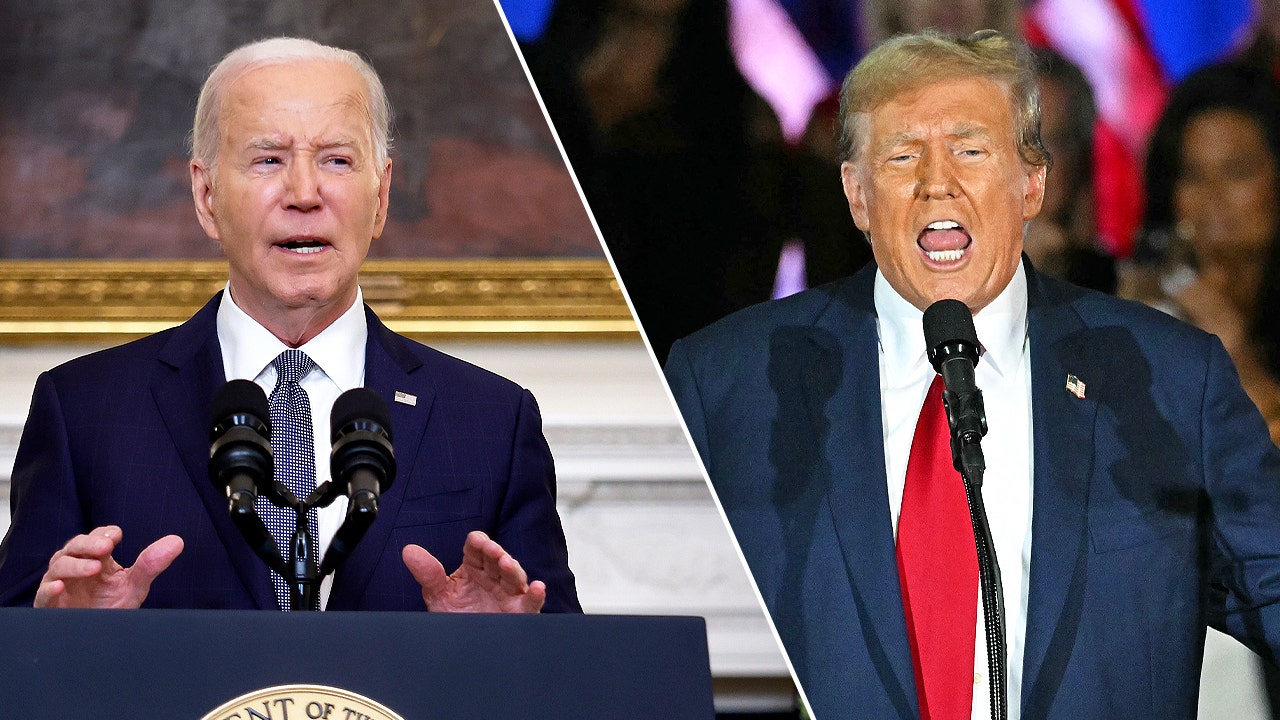
FIRST ON FOX: The White House is taking aim at congressional Republicans over their support for “MAGAnomics” and former President Donald Trump’s “across-the-board tariffs” plan, which it claims would raise prices for families and worsen inflation.
In a Friday memo to “allies and interested parties,” White House deputy press secretary Andrew Bates slammed Republicans for “targeting Medicare and Social Security for cuts, pushing tax welfare for the super-rich, and supporting across-the-board tariffs that would raise costs and taxes for hardworking families.”
“Yesterday congressional Republicans met to plot a 2025 agenda that involves historic tax increases on the middle class in the form of high tariffs, then gives tax handouts to big corporations that are overcharging Americans despite inflation decreasing,” Bates wrote.
Trump met with both Senate and House Republicans on Thursday during his trip to Capitol Hill. Rep. Thomas Massie, R-Ky., said afterward that the former president “briefly floated the concept of eliminating the income tax and replacing it with tariffs.”
TRUMP SELLS SENATE REPUBLICANS ON PLAN TO WIN OVER WORKERS IN CLOSED-DOOR MEETING
President Biden, left, and former President Donald Trump, right. (Getty Images)
“What’s more, the lead House Republican for budget issues, Jodey Arrington, recently wrote, ‘Unchecked mandatory spending on programs like Medicare, Medicaid, Social Security and welfare represent a growing threat to our economic security and potentially our way of life,’” Bates said in the memo.
Pointing to other recent reporting, Bates claimed that “in addition to extending the Trump tax giveaway for billionaires and multinational companies, congressional Republicans want even further corporate tax windfalls that will add another $1 trillion to the deficit.”
President Biden “rejects this dangerous MAGAnomics agenda,” Bates noted.
“His plan would protect and strengthen Medicare and Social Security, further cut the deficit by making rich special interests pay their fair share, and to crack down on the corporate greed that is ripping off American families as inflation falls,” he wrote in the memo. “Republican officials have stood against every aspect of that plan, even defending junk fees and price gouging.”
‘TOTAL LIE’: TRUMP CAMPAIGN, GOP LAWMAKERS BLAST REPORT CLAIMING HE CALLED MILWAUKEE A ‘HORRIBLE CITY’
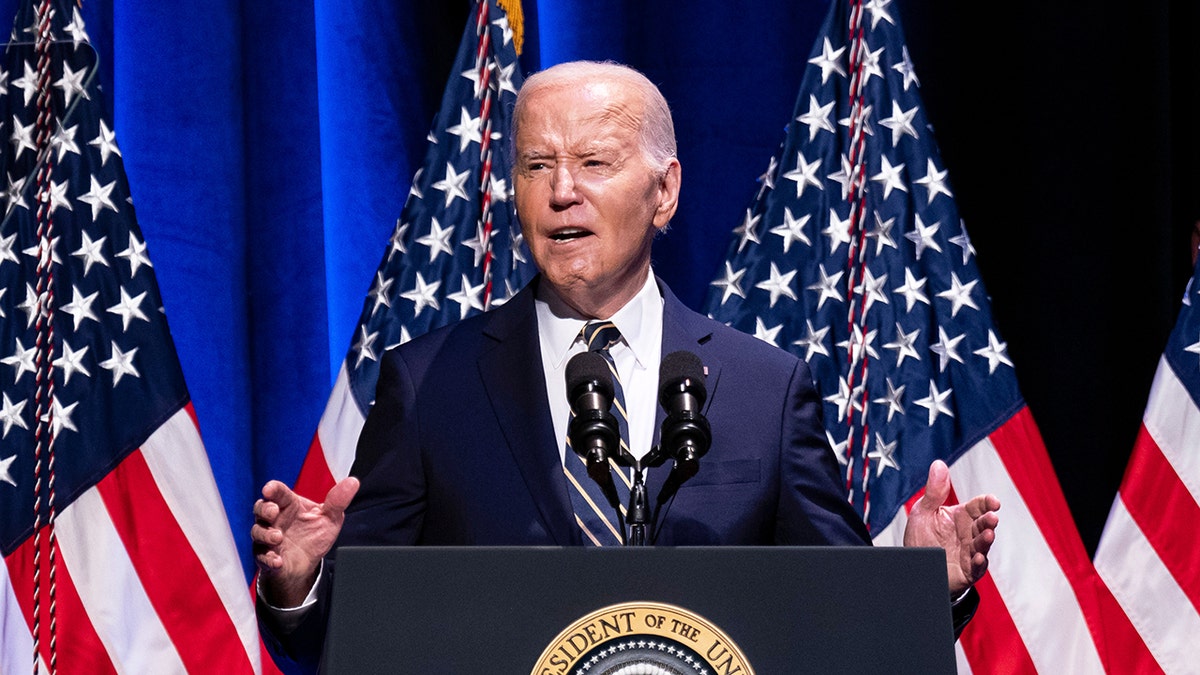
President Joe Biden speaks at the National Museum of African American History and Culture in Washington, D.C, on May 17, 2024. (Al Drago/Bloomberg via Getty Images)
Bates insisted the “MAGAnomics summit puts into relief the stark choice between President Biden’s plan for an economy in which economic growth flows to the middle class, and an economy in which hardworking families are sold out to billionaires and the biggest corporations, forced to pay whatever big corporations want to charge while stripped of the Medicare and Social Security benefits they pay to earn.”
In a statement to Fox News Digital, Karoline Leavitt, the Trump campaign’s national press secretary said, “The Biden campaign is lying because they are losing. President Trump’s first-term pro-growth economic policies created record-low mortgage, interest, and unemployment rates and made inflation virtually non-existent. Americans can expect President Trump’s second-term economic agenda will have the same impact and end Joe Biden’s inflation crisis that continues to rob working families of thousands of dollars every month.”
She added, “President Trump delivered on his promise to protect Social Security and Medicare in his first term, and President Trump will continue to strongly protect Social Security and Medicare in his second term.”
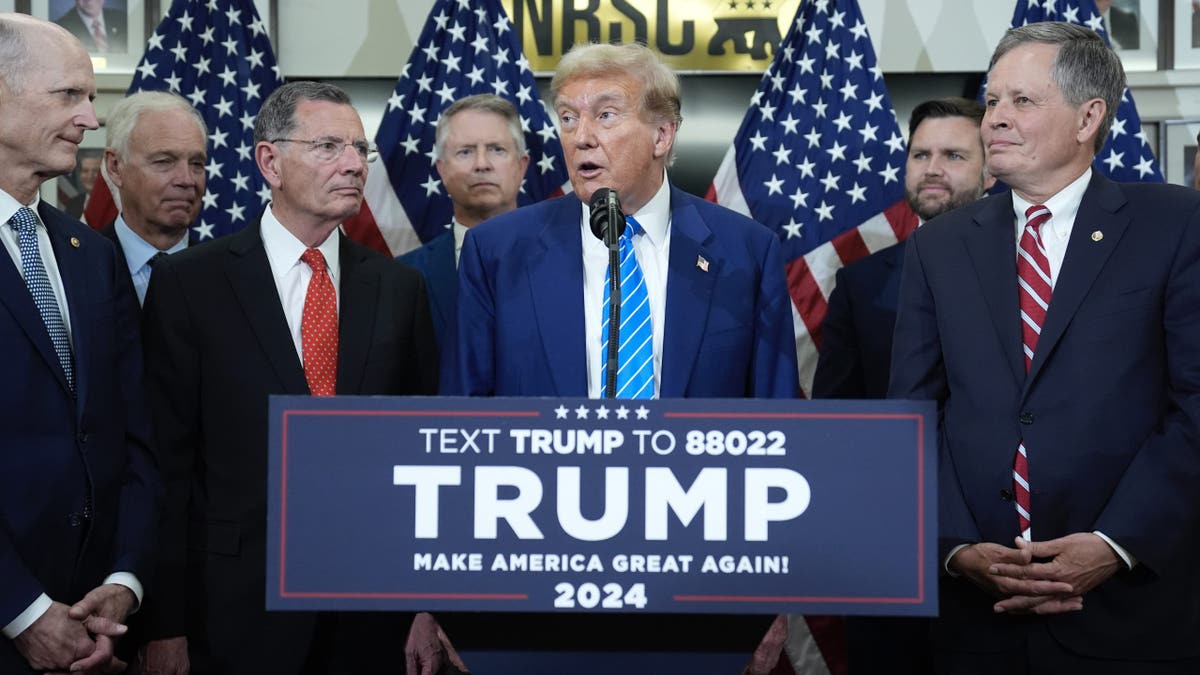
Former President Donald Trump, the presumptive GOP nominee, speaks with reporters at the NRSC on June 13, 2024, in Washington, D.C. (AP Photo/Evan Vucci)
Leavitt insisted the “only candidate who poses a threat to Social Security and Medicare is Joe Biden – whose mass invasion of countless millions of illegal aliens will, if they are allowed to stay, cause Social Security and Medicare to buckle and collapse.”
Trump’s trip to the nation’s capital this week made numerous headlines, as he met for the first time in several years with Senate Minority Leader Mitch McConnell.
Trump told Republican senators that there was tremendous unity in the party, and promised to “bring back common sense to the government” if he’s elected in November.
-

 News1 week ago
News1 week agoIsrael used a U.S.-made bomb in a deadly U.N. school strike in Gaza
-
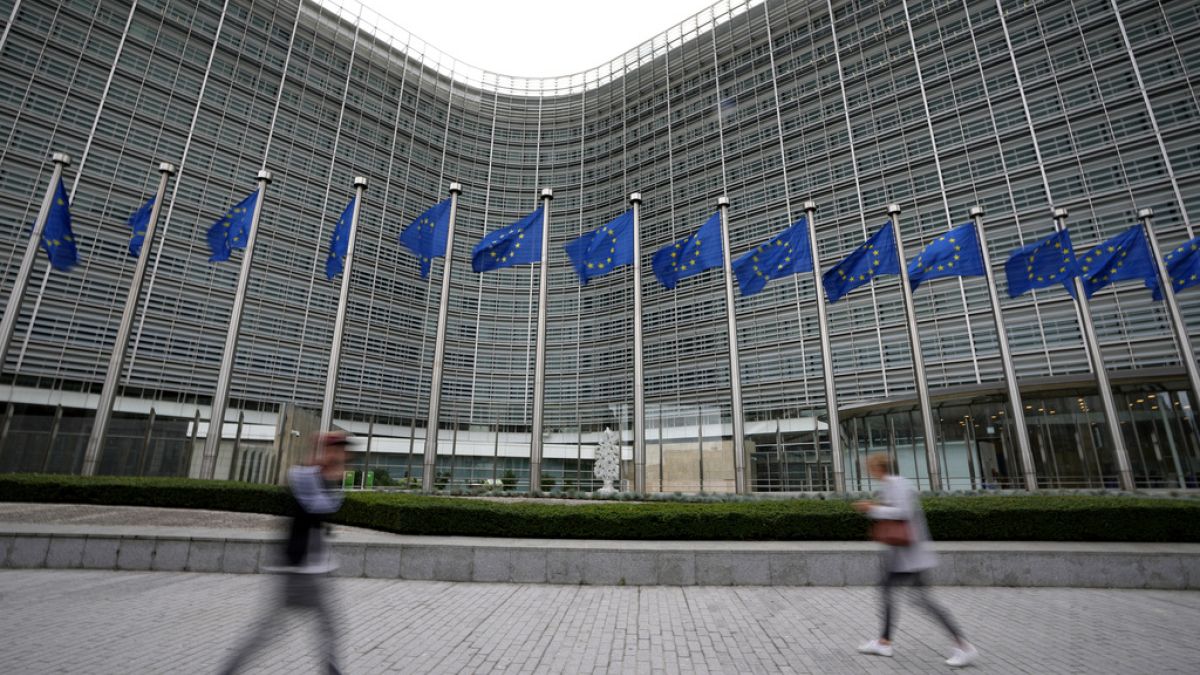
 World1 week ago
World1 week agoEconomy, migration: Voters' main concerns ahead of elections
-
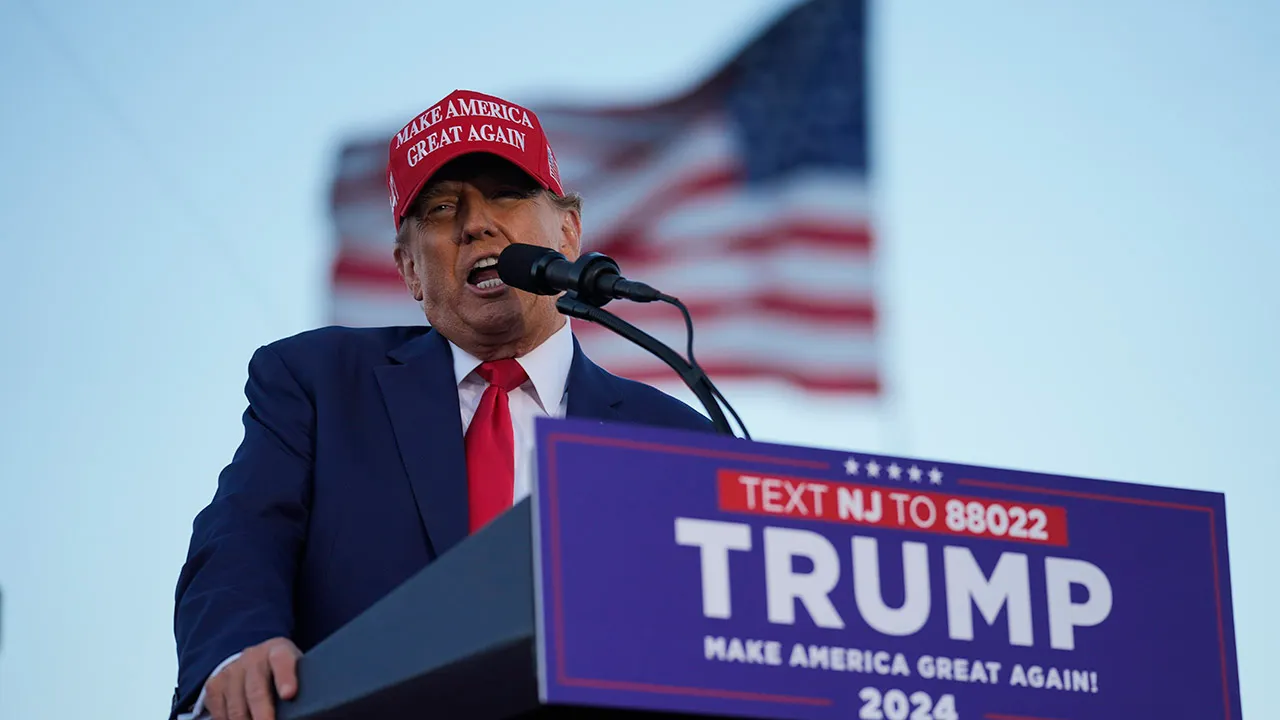
 Politics1 week ago
Politics1 week agoTrump campaign accelerates vetting of potential running mates
-

 Movie Reviews1 week ago
Movie Reviews1 week agoShort Film Review: Blue and White (2022) by Hiroyuki Nishiyama
-

 World1 week ago
World1 week agoWorld leaders, veterans mark D-Day’s 80th anniversary in France
-

 World1 week ago
World1 week agoFrance to provide Ukraine with its Mirage combat aircraft
-

 World1 week ago
World1 week agoRussia-Ukraine war: List of key events, day 833
-
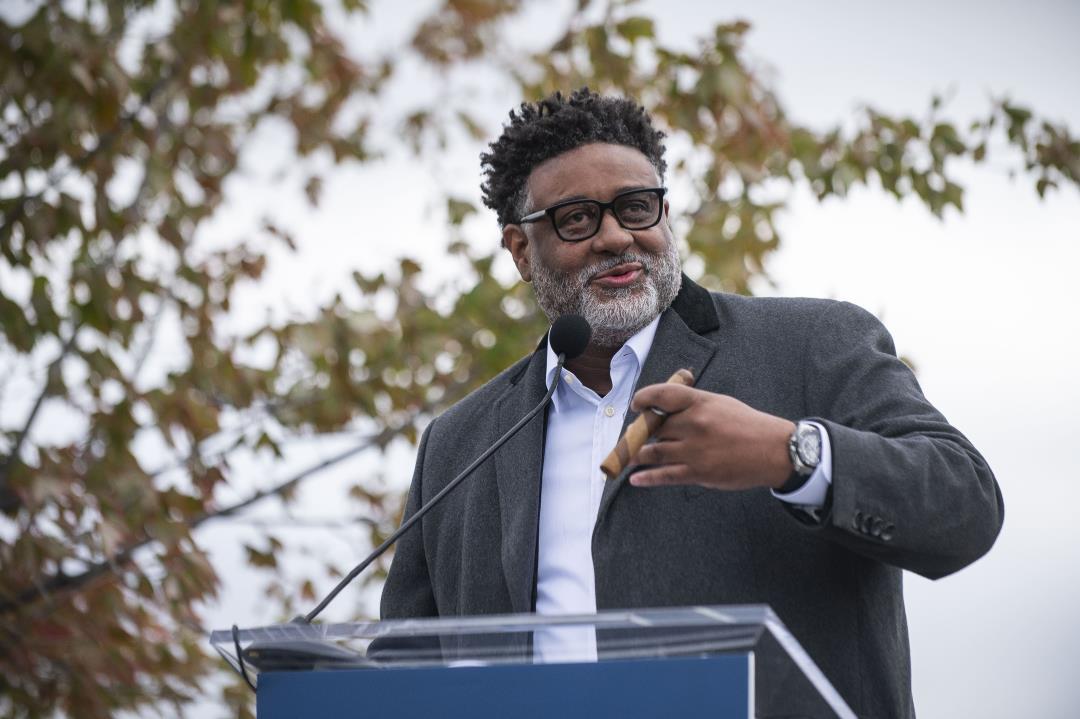
 News1 week ago
News1 week agoNonprofit CFO Accused of 'Simply Astonishing' Fraud













